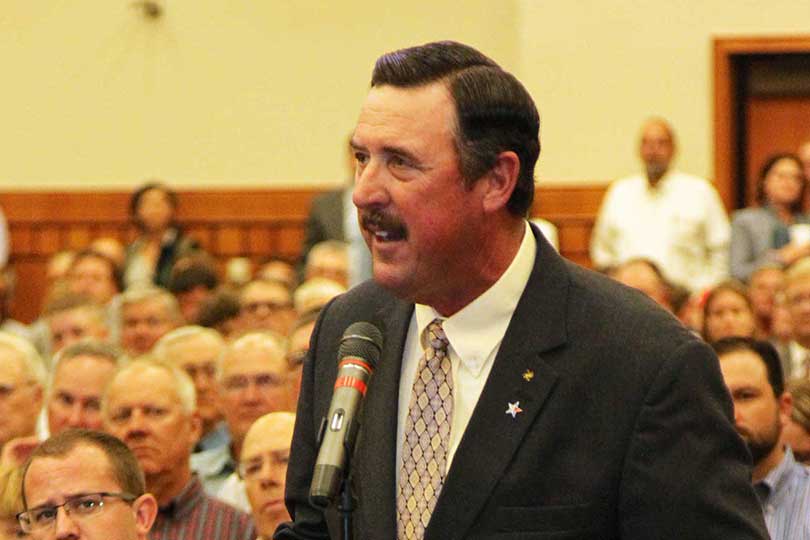By Jessica Domel
Multimedia Editor
The future of the farm bill may be in lawmakers’ hands, but Tuesday, Texas farmers, ranchers and dairymen weighed in with their needs in new farm legislation.
The House Committee on Agriculture hosted a special farm bill listening session in San Angelo for several hours Tuesday afternoon.
Farmers, ranchers, dairymen and rural Texans spoke out on many issues, but one idea was consistent throughout the conversation—the return of cotton to Title 1 of the farm bill.
Unlike growers of other commodities, cotton farmers are not eligible for the Agricultural Risk Coverage (ARC) or Price Loss Coverage (PLC) safety net programs due to the way the 2014 Farm Bill was written.
“It’s killing us. You’ve been hearing this about young farmers, and we are losing them at a rapid rate. That’s serious. This is going to be my fourth year I’m praying I can break even. You better start worrying about guys like me, and you better start worrying about the entire industry,” Dan Smith, Lockney cotton farmer and Texas Farm Bureau (TFB) state director, said.
Smith has grown cotton for 43 years. He told the committee the lack of a safety net is critical and needs to be addressed.
“Our backs are to the wall. This thing is serious. I had to pay $440 for a sack of cotton seed this year. With 60 cent cotton, it’s just not going to work,” Smith said. “We need some help. Cotton has to be a Title 1 commodity.”
The inclusion of cotton was on the minds of many, and not just cotton farmers.
Tony Dill, of Western Peanut Growers, said peanut growers are pleased with the provisions they were afforded in the 2014 Farm Bill, but they also need cotton to be included in Title 1.
He noted that almost all peanut growers also have cotton acreage and are impacted by the lack of a safety net.
“In my hometown of Brownfield, Texas, I have five young growers that have gone out of business in the last three years because of mainly being cotton growers,” Dill said. “They financially cannot get loans. They don’t have cash flow. It’s a very severe issue in our county and West Texas.”
More than one farmer in attendance suggested ways cotton farmers could find help now to ensure they make it through to the next season.
“We’ve had drought, hail, low commodity prices and a sandblasting, which has created a lot of debt,” said Richard Gaona, a cotton, wheat and hay farmer and president of the Rolling Plains Cotton Growers. “This is where we are with the current farm bill. To get West Texas cotton farmers through until the next farm bill is approved, farmers and ag lenders would appreciate a cotton-ginning assistance payment and the designation of cotton seed for the 2018 crop to help offset the carryover debt.”
TFB President Russell Boening stressed the importance of cotton as well. He also noted the Dairy Margin Protection Program hasn’t worked and needs to be fixed.
“Since the 2014 Farm Bill, we all know net farm income has dropped dramatically—almost 50 percent. At that time, agriculture contributed $23 billion in deficit reduction in the 2014 Farm Bill. Due to the fact that the economy in the farm sector has dropped dramatically, we need a strong safety net to keep going forward to have a strong agricultural sector,” Boening said. “We support the continuation of PLC and the ARC programs. We know the ARC program had some issues between counties. We think the ARC-County program should be looked at.”
Crop insurance is vital to Texas, Boening said, whether it be for corn, wheat or cotton.
“It’s critical that we provide adequate price protection for farmers by way of addressing more realistic cost of production and updating yields and base,” Lindsey Bowers, a grain sorghum, corn and catfish farmer from Inez, said. “We need to maintain affordable crop insurance and oppose any limitations on crop insurance that would discourage participation.”
Bowers shared that last year at the co-op where she works, corn farmers lost an average of $150 per acre. Crop insurance didn’t help most of them, including the Bowers’ family.
“The farm bill should be a living document that provides adequate and stable support for our farmers who are faced with a changing farming environment depending on the marketing conditions, where you farm, what the weather is doing, technological advan


My name is Karen Jan Beaty Spruill and I currently live in Granbury, Texas. I own a farm in Ropesville, Hockley County, Texas, which has been in my family for over seventy years. I am proud to say that it is being farmed by Mike Henson who spoke before the committee yesterday. I appreciate your meeting with the Texas farmers about the 2018 farm bill. Most decision makers in Washington have no reason to understand the plight and problems of the American farmer so please share all you are learning. These hard working farmers are only asking for a fair chance to help them remain in business, after all where would all of us be without the American farmers?
Amen! We just need a fighting chance!